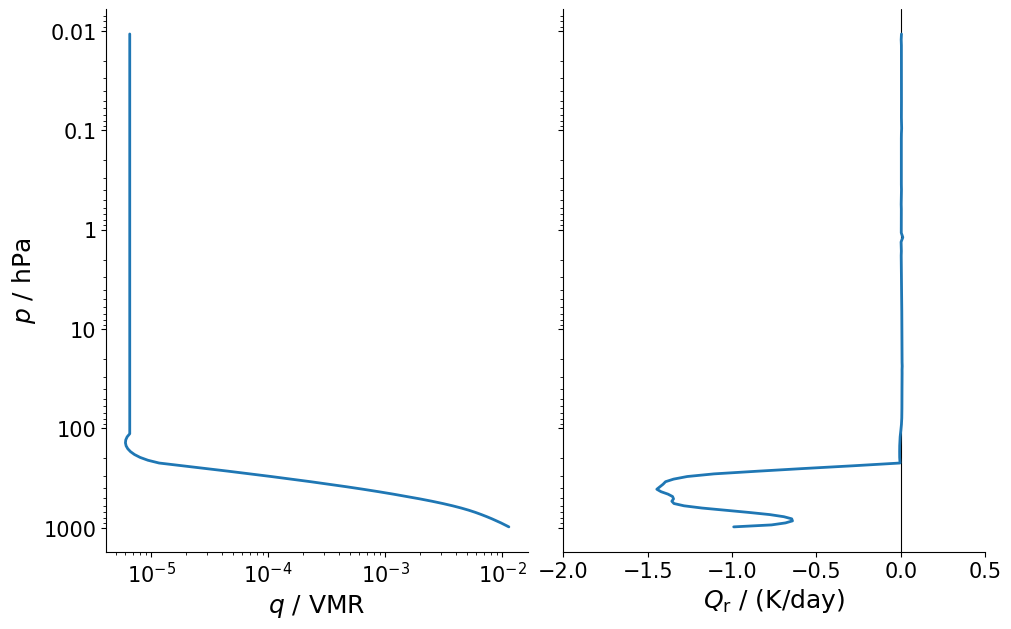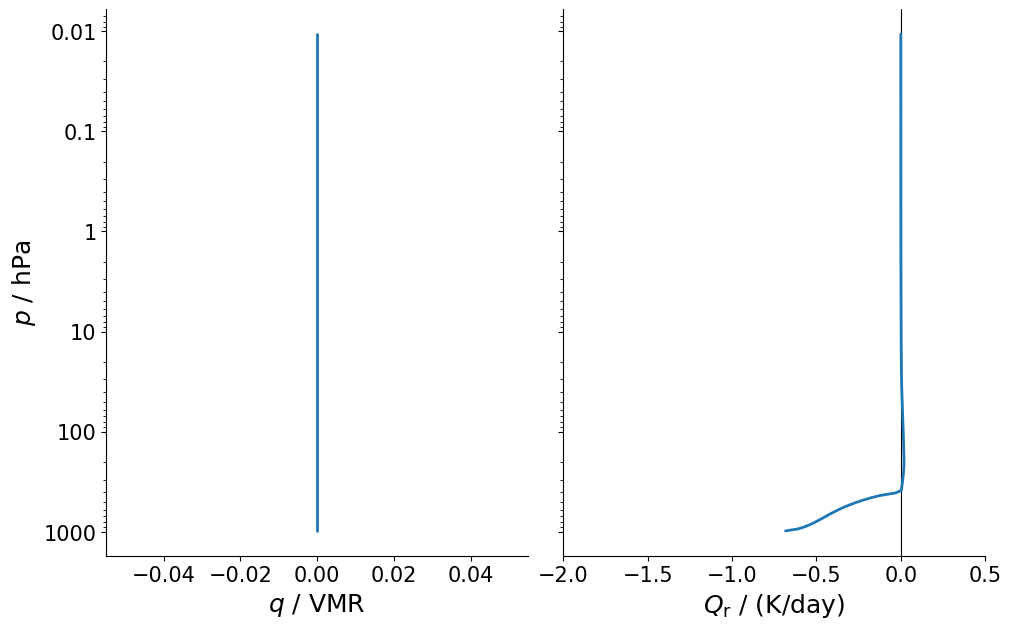Humidity#
import matplotlib.pyplot as plt
from typhon import plots
import konrad
plots.styles.use('typhon')
Fixed relative humidity#
By default, konrad will preserve the relative humidity in the atmospheric column.
Internally, this is done by the FixedRH component, which will use a given function that prescribes the vertical distribution of relative humidity.
There are various pre-defined functions in konrad.humidity, for example, a vertically uniform humidity distribution.
humidity_model = konrad.humidity.FixedRH(
rh_func=konrad.humidity.VerticallyUniform(0.7),
)
Next, we can compile and run our RCE simulation
plev, phlev = konrad.utils.get_pressure_grids(1000e2, 1, 128)
atmosphere = konrad.atmosphere.Atmosphere(phlev)
rce = konrad.RCE(
atmosphere,
surface=konrad.surface.FixedTemperature(temperature=288.), # Run with a fixed surface temperature.
humidity=humidity_model, # Here, we pass the humidity component that we just created
timestep='12h', # Set timestep in model time.
max_duration='150d', # Set maximum runtime.
)
rce.run() # Start the simulation.
The vertical humidity distribution is one of the largest controling factors for the net radiative heating \(Q_r\) in the atmosphere. \(Q_r\) is a decisive quantity in climate science as it destabilizies the atmosphere, which is a premise for convection of air masses.
fig, (ax0, ax1) = plt.subplots(ncols=2, sharey=True)
plots.profile_p_log(rce.atmosphere['plev'], rce.atmosphere['H2O'][-1, :], ax=ax0)
ax0.set_xlabel(r"$q$ / VMR")
ax0.set_xscale("log")
ax0.set_ylabel("$p$ / hPa")
ax1.axvline(0, color="k", linewidth=0.8)
plots.profile_p_log(rce.atmosphere['plev'], rce.radiation["net_htngrt"][-1, :], ax=ax1)
ax1.set_xlim(-2, 0.5)
ax1.set_xlabel(r"$Q_\mathrm{r}$ / (K/day)")
Text(0.5, 0, '$Q_\\mathrm{r}$ / (K/day)')

Fixed absolute humidity#
There is also a special class that will keep the absolute amount of water vapor fixed. This can be used to turn off the water-vapor feedback in a simulation, or, to run a simulation without any water vapor at all.
plev, phlev = konrad.utils.get_pressure_grids(1000e2, 1, 128)
atmosphere = konrad.atmosphere.Atmosphere(phlev)
atmosphere["H2O"][:] = 0.0 # Remove all water-vapor from the atmospheric column
humidity_model = konrad.humidity.FixedVMR() # Preserve the absolute humidity
rce = konrad.RCE(
atmosphere,
surface=konrad.surface.FixedTemperature(temperature=288.), # Run with a fixed surface temperature.
humidity=humidity_model, # Here, we pass the humidity component that we just created
timestep='12h', # Set timestep in model time.
max_duration='100d', # Set maximum runtime.
)
rce.run() # Start the simulation.
fig, (ax0, ax1) = plt.subplots(ncols=2, sharey=True)
plots.profile_p_log(rce.atmosphere['plev'], rce.atmosphere['H2O'][-1, :], ax=ax0)
ax0.set_xlabel(r"$q$ / VMR")
ax0.set_ylabel("$p$ / hPa")
ax1.axvline(0, color="k", linewidth=0.8)
plots.profile_p_log(rce.atmosphere['plev'], rce.radiation["net_htngrt"][-1, :], ax=ax1)
ax1.set_xlim(-2, 0.5)
ax1.set_xlabel(r"$Q_\mathrm{r}$ / (K/day)")
Text(0.5, 0, '$Q_\\mathrm{r}$ / (K/day)')

